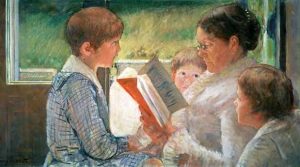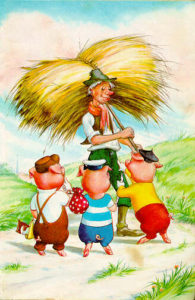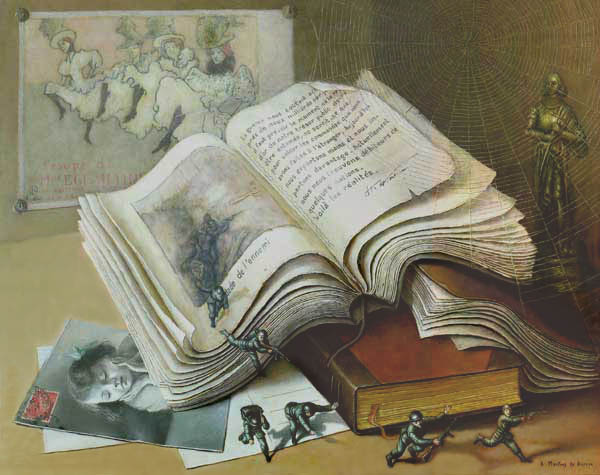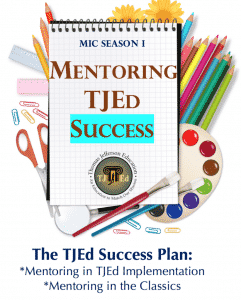Please click on a title to skip to the article you want; or, simply scroll down the page to view them all in order.
Featured Articles:
-
Oliver DeMille: “Them, not You: A Problem We Can Solve”
-
Rachel DeMille: “Are you just reading to them? GIGO.”
Other Features:
Them, not You!
A Problem We Can Solve
by Oliver DeMille
Introduction
There is a major tragedy brewing in America. It is not the reality that while only 1 state had budget a deficit in 2007, in 2010 an astounding 48 fell short—nor that the federal government stimulus money is running out and won’t be there to help them get through 2011. It is not that huge numbers of private jets fly our skies unchecked by TSA security and that it may only be a matter of time until Al-Qaeda does something about it. It is not the calamity that the unemployment rate has gone from 4.7% in 2007 to 9.8% now and even higher when you count people who have given up looking for a new job.
Nor is it the largest looming American tragedy that the federal deficit has gone from $161 billion in 2007 to $1.3 trillion in 2010 and worse this year. All of these are real challenges, and indeed each was mentioned in just one issue of The Atlantic (January 2011). Of course, there are many more that weren’t discussed.
I’ve always believed that optimism is the most accurate policy, and now is no exception. Optimism works best when we see the realities and then figure out truly positive ways to respond.
The Bad News
The big tragedy ahead, the one I think will have truly drastic consequences in the years and decades ahead, is this: The average minutes spent reading per weekend day by 15 to 19 year olds has gone down from 16 in 2007 to just 5 in 2009. That’s right; when they aren’t in school being required to read, our youth now voluntarily choose to read just 5 minutes a day.
This is a disaster of grand proportion in the making. Leaders have always been readers, and the only free societies have been those where reading was widespread and popular among the “regular” people. Remove reading and freedom quickly goes away—along with prosperity and a lot of other family and individual benefits.
Through ancient history those who could read ruled those who could not, and this pattern lasted through the classical and medieval worlds. The Renaissance was, above all, a rebirth of reading; the same is true of the Enlightenment, which presaged the American Founding. English freedom followed the spread of reading, as did rising freedom in other nations through history (e.g. Athens, Golden-Age Israel, the Franks, the Swiss Cantons, the Saracens and the free Germanic states). Egypt, Babylon, Rome, China and various monarchies had their golden ages, but only the upper classes (readers) took part; life for the uneducated classes was painful and marked by poverty and servitude.

Peter Vilhelm Ilsted, “Woman reading by candlelight”
In early New England, literacy rates well above 90% foreshadowed and coincided with the Revolutionary and Constitutional eras. The pioneers took the best books with them across rivers, mountains and plains—and read them over and over again. Their children followed their example. I have said before that a nation whose regular members read and deeply understood The Federalist has a different education than ours today, and that the type of regular citizens who sat quietly listening to six hours of a Lincoln-Douglass debate and then followed up with months of heated debate is a rarity in modern America.
The United States was built on the concept that nearly every regular citizen would have an education just as good as the President or any Senator, Judge or Governor. So when our 15-19 year olds only spend 5 minutes a day of their free time reading, our freedoms, prosperity and future are in very real jeopardy.
Lincoln is credited with saying that the culture of the schoolroom in one generation will be the culture of government in the next; it is a profound thought. With this in mind, we should have real concerns about the next generation.
The Good News
Fortunately, this is one national (and international) problem that we can do something about. We are not dependent on policy-makers, politicians or experts to remedy this situation. Whatever happens with unemployment, government budgets, national debts, terrorists with planes, or the myriad other things most of us feel powerless to resolve, the reading thing is completely in our power to change.

Source: BlissfullyDomestic.com
The really good news is that of all the challenges mentioned here, this one has the most potential to positively influence the others, because a nation of readers naturally becomes a nation with more leaders, and leadership is one of those catalytic things which drastically impacts everything it touches. If you want to improve the world, you can hardly do anything more powerful than help somebody fall in love with reading.
To be honest, most of us in TJEd probably haven’t done enough to share our love of reading with others and promote more reading—especially among the youth. For all that we have done, we still haven’t done nearly enough. There is so much more we can do.
For example, get a blank piece of paper and a pen. Now think of everyone you know who might fall in love with learning if you invited them. Write down their names. Consider those in the various groups you belong to. Don’t forget to think of 15-19 year olds you know. Make a list. Really. Your list could change the world. Who knows who is on your list—a future Einstein, Jefferson, or Mother Teresa?
Without reading, Jefferson never would have amounted to much. Same with the other greats in history—just name your favorite. And then go back to your list of names.
Your list matters. Who do you know that hasn’t yet fallen in love with reading?
Once you have a list, use your Inventory skills; sit down and brainstorm how to invite each of them to love reading. How can you inspire them? Is there a certain book that you think will resonate with them? Will it be most effective to gift the book or to recommend it to them? Would a book on Kindle be more interesting to them than a hard copy? Would a movie or audiobook be more effective than a book? Would a science fiction series do the trick? What about inviting them to a book discussion party, or a simulation you could arrange? Or just sharing with them how much you love a certain book and telling them they’ve “just got to read it—it’s sooooo good!” Just sharing your own enthusiasm can be contagious. Many people have simply forgotten how much they love to read–or given in to the notion that they don’t deserve to take that kind of personal time.
If they just need permission, by all means, volunteer to give them permission!
We need a nation of readers, you know it, and you know people who should be part of it. Now you just have to figure out how to get them excited to become an avid reader. Some might turn you down, but others will get into reading and share it with still others. You’re already a reader, so this is about them, not you.
Make a Difference Now
I know it sometimes feels hard enough just to make yourself read a classic and truly inspire your children, but the world needs a lot more readers—and if those who are already in love with reading don’t inspire others to read, who will? When you spread your passion for reading to others, you literally influence the future of freedom and prosperity through leadership.
There are many problems in the world which most of us can’t do much right now to change or improve, but spreading love of reading is something we can all take part in—and in the long term it builds the leaders who will overcome the problems of the future. The leaders of the future are reading today…or maybe not. When we help spread a love of reading, we are improving the future in a real, tangible and lasting way.
If this seems like too much to you, just gift more books. And write a note with the book telling the recipient why you gave it to them and how much you love it. The tyrants of history have fought freedom by burning books, because they know the power of reading. In contrast, those who truly want to improve the world can find ways to increase the love of reading in our families, communities and society. For those who resonate with Leadership Education, this is a natural process. Simply look for ways and opportunities to more actively share your love of reading with others!
Are you *just* reading to them? GIGO.

Mary Cassatt, “Reading to Children”
So much has been said about the importance of reading to our kids; and those of us who do can attest that it’s a formative experience–on so many levels:
- Bonding
- Laughing
- Making memories
- A shared language
- Gratitude
- Reliving the past
- Pity and compassion
- Empathy for others
- Tenderness
- Shared stories/quotes/inside jokes
- Moments of transparency and unguarded confiding
- Feelings of righteous outrage and commitment to make a difference
- Self discovery and desire to improve
- Exploring new ideas/places/words/peoples/images
- Connecting with our ancestors/predecessors
- Deepened affection for family
- –and so much more…
It occurred to me one day last week, when I was teaching a little lesson for a group of friends and their kids (we take weekly turns for an hour of class before the kids play together), that I do something a little more than just reading. It’s one of those things that comes so naturally that sometimes you forget to even comment on it or suggest it to others.
 As I taught our little group about the the power of stories to help us “Remember”, I retold the traditional folktale of the 3 Little Pigs–not the Disney version, but the one where the piggies actually get gobbled up because their houses were not made to last. And then I did what I always do: I started to ask questions about the story.
As I taught our little group about the the power of stories to help us “Remember”, I retold the traditional folktale of the 3 Little Pigs–not the Disney version, but the one where the piggies actually get gobbled up because their houses were not made to last. And then I did what I always do: I started to ask questions about the story.
We had a discussion about it. In technical mentoring terms, we had a “debriefing.” It took longer to discuss the story and listen to the responses from the kids and their moms than it did to tell the thing, and it could have gone on for three times as long. There is so much to talk about when you have a good quality story!
I found a version on the web that’s really close to the one I read to the kids. You can view it here. (Click on the arrows at the bottom of each illustrated panel to “turn the page”.)
Some of the things we discussed:
- Why did the piggies leave their first home?
- Where did the little pigs get the materials to build their houses?
- Does it seem strange that the man gave away the straw/wood/bricks just because the pigs needed them and asked for them–without paying?
- Do you think the man would have given away the materials if they hadn’t asked?
- Who in our lives gives us what we need, just because we ask?
- Why is asking an important part of that process?
- How did the pigs get the houses? [They built them]
- How much did they cost? [Only the cost of their labor]
- So basically, they all cost the pigs the same amount; which house was the most valuable, and why?
- Why would a pig ask for free materials of lesser value, and put his effort into building a house that doesn’t actually do what a house should do–protect and shelter?
- Do we ever ask for things that aren’t of lasting value?
- Do we ever put our effort into things that don’t serve our interests? How/What?
- Did the unfortunate piggies try to avoid the wolf? Why were they unable to do so? [Because they had not prepared adequately]
- Did the wise piggy try to avoid the wolf? How? [He put in extra effort to use the resources he had been freely given by the man so that the wolf wouldn’t be able to enter his home. He also made plans and sacrifices in an effort to never be in the same place with the wolf when he had to leave his home.]
- What happened to the foolish piggies? Does misfortune ever come to those who mean well but do less than they could?
- How does this apply to us?
 There are many more questions that could come from such a story. But obviously, just any old version of the story doesn’t provide such fertile thought. Some common versions are stripped of the details that make this one such a great discussion. This is why we recur to the classics. They stay around generation after generation, retelling after retelling, because they have more than a bossy moral at the end; they have myriad open questions embedded in the details.
There are many more questions that could come from such a story. But obviously, just any old version of the story doesn’t provide such fertile thought. Some common versions are stripped of the details that make this one such a great discussion. This is why we recur to the classics. They stay around generation after generation, retelling after retelling, because they have more than a bossy moral at the end; they have myriad open questions embedded in the details.
Not all stories are created equal; not all reading times are created equal. It sort of brings to mind the computer science term, “Garbage in, garbage out.” The common acronym is: GIGO. It means, the quality of output is determined by the quality of input. How many times have we pulled out our hair in frustration because our computer (or vacuum, or car, or…) isn’t reliably doing what we need it to do? Somewhere in the programming, design, construction or planned obsolescence of the tool we were confronted with its limitations. And yet, a sleek, well designed program can really make your life a dream and simplify your work; and there’s nothing as quite so glorious as a vacuum or car that you absolutely love!
When it comes to family reading time (or personal reading, or leisure pursuits), are we choosing materials freely available to us that don’t serve our interests? Are we putting in the time and effort, but getting inferior results?
GIGO. The lesson of the 3 Pigs tells us this:
- Choose the highest quality materials
- Put in the extra effort to put them to work (Don’t just read; interact. Don’t just lecture; listen.)
- Shun, dismiss and expel the influences that distract, compete or deceive
 I think sometimes moms and dads feel overwhelmed, frustrated or disillusioned with their family’s education and have no idea that the fix could be as simple as having a family reading time with a great classic. Consider: if I had chosen a different version of the 3 Little Pigs, what kind of discussion might have ensued? How might I have spent that 30 minutes? What additional effort or floundering might I have gone to, and never had such an enriching and bonding experience with my kids and friends?
I think sometimes moms and dads feel overwhelmed, frustrated or disillusioned with their family’s education and have no idea that the fix could be as simple as having a family reading time with a great classic. Consider: if I had chosen a different version of the 3 Little Pigs, what kind of discussion might have ensued? How might I have spent that 30 minutes? What additional effort or floundering might I have gone to, and never had such an enriching and bonding experience with my kids and friends?
To my way of thinking, it would have been a lot harder, and a lot less fulfilling. When we’re engaged with a great classic, I don’t have to have 7 different lessons going on for 7 different kids at home. They each take from that experience something that applies to them specifically. In fact, my 18-year-old daughter happened to pass by the parlor while I was leading the 3 Pigs discussion and she stayed to take it in. It was every bit as interesting and relevant for her as it was for my neighbor’s 4 year old. She commented to me afterward that she hadn’t realized how much there was to think about in that story! My response: that’s the power of classics and mentors. GIGO. Quality in, quality out.
 And in this case, quality also translates to all the wonderful feelings and experiences I listed at the beginning of this article. After such a discussion, the natural result is a spirit of harmony and productivity that never fails to lead to other wonderful projects and happy times throughout the rest of the day. Isn’t that more productive and less stressful than the alternative?
And in this case, quality also translates to all the wonderful feelings and experiences I listed at the beginning of this article. After such a discussion, the natural result is a spirit of harmony and productivity that never fails to lead to other wonderful projects and happy times throughout the rest of the day. Isn’t that more productive and less stressful than the alternative?
What do you think will happen to your family’s education when you input the classics and debrief with interactive listening? What will the output be? Sounds like a good time to employ the scientific method….
Want more coaching on using Classics and Discussion and creating your family education ideal? You want Mentoring in the Classics!!
Click here for details >>
The Student Whisperer
The wait is finally over! The Student Whisperer by Oliver DeMille and Tiffany Earl is now available. Reader response is the best ever. See for yourself:
- “My ‘epiphanal rate’ was off the charts.”
- “I was moved beyond words.”
- “…a guide book for all who want to truly mentor well and make a difference in the world.”
- “…a classic! [It] will apply to the businessman and homeschooling mom alike.”
- “…no matter what I say it would be an understatement.”
Click here to read complete reviews >>
Resources to Leverage Your Success

- List of Classics (Family Reading, Adults, Kids, Math Lists, Biblical Highlights and more!)
- Trainings and Daily Resources
- This Week in History
- Mentoring in the Classics
- TJEd on Facebook
- TJEd Products


